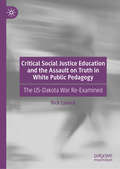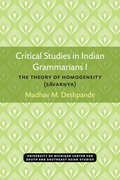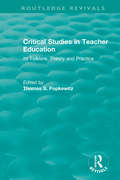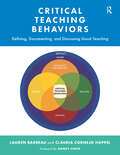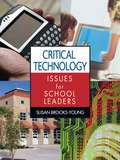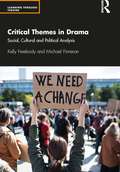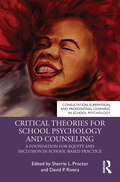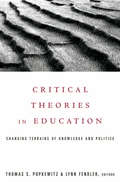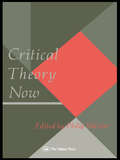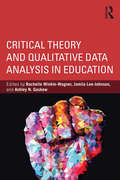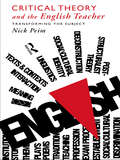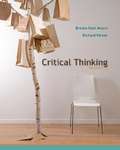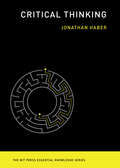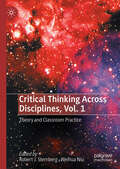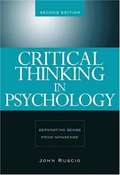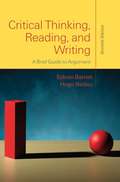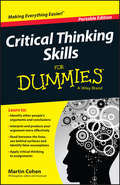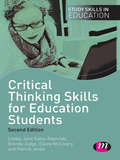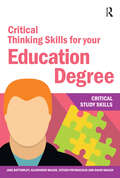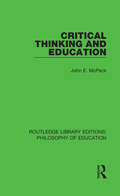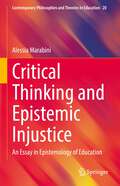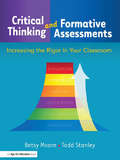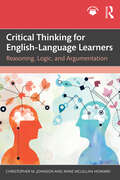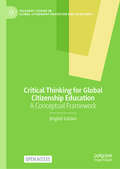- Table View
- List View
Critical Social Justice Education and the Assault on Truth in White Public Pedagogy: The US-Dakota War Re-Examined
by Rick LybeckThis book explores tensions between critical social justice and what the author terms white justice as fairness in public commemoration of Minnesota’s US-Dakota War of 1862. First, the book examines a regional white public pedagogy demanding “objectivity” and “balance” in teaching-and-learning activities with the purpose of promoting fairness toward white settlers and the extermination campaign they once carried out against Dakota people. The book then explores the dilemmas this public pedagogy created for a group of majority-white college students co-authoring a traveling museum exhibit on the war during its 2012 sesquicentennial. Through close analyses of interviews, field notes, and course artifacts, this volume unpacks the racial politics that drive white justice as fairness, revealing a myriad of ways this common sense of justice resists critical social justice education, foremost by teaching citizens to suspend moral judgment toward symbolic white ancestors and their role in a history of genocide.
Critical Studies in Indian Grammarians I: The Theory of Homogeneity (SĀVARṆYA) (Michigan Series In South And Southeast Asian Languages And Linguistics)
by Madhav M. DeshpandeIn the historical study of the Indian grammarian tradition, a line of demarcation can often be drawn between the conformity of a system with the well-known grammar of Pāṇini and the explanatory effectiveness of that system. One element of Pāṇini’s grammar that scholars have sometimes struggled to bring across this line of demarcation is the theory of homogeneity, or savarṇa, which concerns the final consonants in Pāṇini’s reference catalog, as well as phonetic similarities between sounds. While modern Sanskrit scholars understand how to interpret and apply Pāṇini’s homogeneity, they still find it necessary to unravel the history of varying interpretations of the theory in subsequent grammars. Madhav Deshpande’s The Theory of Homogeneity provides a thorough account of the historical development of the theory. Proceeding first to study this conception in the Pāṇinian tradition, Deshpande then passes on to other grammatical systems. Deshpande gives attention not only to the definitions of homogeneity in these systems but also the implementation of the theory in those respective systems. Even where definitions are identical, the concept may be applied quite differently, in which cases Deshpande examines by considering the historical relationships among the various systems.
Critical Studies in Teacher Education: Its Folklore, Theory and Practice (Routledge Revivals)
by Thomas S. PopkewitzOriginally published in 1987, this was the only available book to offer a critical interpretation of the current reform efforts in teacher education at the time. The focus is issues of professionalization, the role of the university and schools in the socialization of teachers, and the ideological and social assumptions that underlie educational theory. The book draws upon the sociology of knowledge, Marxist theory and political sociology.
Critical Teaching Behaviors: Defining, Documenting, and Discussing Good Teaching
by Lauren Barbeau Claudia Cornejo HappelWhat does “good” teaching mean, and how can we know it when we see it? Perhaps you have grappled with these questions at some point in your career, either as an instructor wanting to document or grow your teaching effectiveness or as a peer or administrator trying to provide guidance to or assess the teaching of others.This book serves three purposes: a condensed, evidence-based guide to effective teaching; a resource on creating a focused teaching narrative and teaching portfolio; and a toolkit that equips faculty to conduct peer observations, student midterm feedback, and productive conversations related to teaching.The first part of the book offers a rich guide as to what constitutes effective teaching based on a comprehensive review of the research on instructional strategies and behaviors that promote student engagement, learning, and success. It includes practical advice flexible enough to accommodate disciplinary and contextual differences, recognizing that readers will want to adapt effective behaviors based on their values and dispositions.The opening chapters successively cover aligning classroom activities to learning goals; teaching inclusively to account for students’ prior learning and diversity; creating an environment that promotes students’ active engagement in learning and taking responsibility for their intellectual development; assessing students’ progress and adjusting teaching accordingly; using technology effectively; and finally engaging in reflective self-assessment with feedback from peers and students to adjust and develop teaching skills.In the second part of the book, the authors offer structured guidance on developing a focused teaching narrative, gathering peer and student feedback to support that narrative, and curating a portfolio to showcase exemplary practices and achievements. The insights and tools presented also equip readers to facilitate classroom peer observations and gather midterm student feedback. Overall, the second part of the book provides readers with a common language and tools to use when discussing teaching with peers and those who may formally or informally observe their teaching. The book builds to providing the reader with a clear sense of the criteria and evidence needed to document their teaching for the purposes of annual review, promotion, or tenure.The now widely recognized Critical Teaching Behaviors (CTB) framework offers a holistic means of documenting and assessing teaching effectiveness by including a variety of evidence and perspectives. The comprehensive feedback and documentation toolkit aligned to the framework incorporates more of the instructor’s perspective on their own teaching into the evaluation process and substitutes for or supplements student evaluations of teaching (SETs). Administrators will also find the CTB useful as a template and guide for the objective evaluation of teaching.In a single volume, this book offers faculty evidence-based guidance and encouragement to explore effective teaching strategies whether they are just embarking on their college teaching journey or are experienced instructors looking to explore new ideas. The CTB presents instructors a roadmap to both developing teaching skills and demonstrating achievements in promoting student learning to advance their careers. It is designed to be an interactive workbook. While readers can choose to read passively, they will get the most value from this book by completing the prompts and activities along the way.
Critical Technology Issues for School Leaders
by Dr Susan J. Brooks-YoungThis resource helps school leaders focus on critical technology leadership issues and practical solutions for integrating technology into any school, administration, or professional development program.
Critical Themes in Drama: Social, Cultural and Political Analysis (Learning Through Theatre)
by Kelly Freebody Michael FinneranCritical Themes in Drama is concerned with the relationship between drama and the current socio-political context. It builds on and contributes to ongoing scholarly conversations regarding the use, benefit, challenges and opportunities for drama and theatre as a social, cultural, educational and political act. The intention of this book is to canvas current theory and practice in drama, to provide an extended examination of how drama as a pro-social practice intersects with socio-cultural institutions, to link critical discourse and examine ways drama may contribute to a broader social justice agenda. Authors draw on a variety of theoretical tools from the fields of sociology, anthropology and cultural studies. This combines with an exploration of work from drama practitioners across a variety of countries and practices to provide a map of how the field is shaped and how we might understand drama praxis as a social, cultural and political force for change. This book offers drama scholars, practitioners, researchers and teachers a critical exploration which is both hopeful and critical; acknowledging the complexities and potential pitfalls, while celebrating the opportunities for drama as a practice for social action and positive change.
Critical Theories for School Psychology and Counseling: A Foundation for Equity and Inclusion in School-Based Practice (Consultation, Supervision, and Professional Learning in School Psychology Series)
by Sherrie L. Proctor David P. RiveraCritical Theories for School Psychology and Counseling introduces school psychologists and counselors to five critical theories that inform more equitable, inclusive work with marginalized and underserved student populations. Offering accessible conceptualizations of each theory and explicit links to application in practice and supervision, the book speaks to common professional functions and issues such as cognitive assessment, school-based counseling, discipline disproportionality, and more. This innovative collection offers graduate students, university faculty, and practicum and internship supervisors an insightful new direction for serving learners across diverse identities, cultures, and abilities.
Critical Theories in Education: Changing Terrains of Knowledge and Politics (Social Theory, Education, And Cultural Change Ser.)
by Lynn Fendler Thomas S PopkewitzThis book examines critical theories in education research from various points of view in order to critique the relations of power and knowledge in education and schooling practices. It addresses social injustices in the field of education, while at the same time questioning traditional standards of critical theory. Drawing on recent social and lit
Critical Theory Now
by Philip WexlerFirst Published in 1991. Routledge is an imprint of Taylor & Francis, an informa company.
Critical Theory and Qualitative Data Analysis in Education
by Rachelle Winkle-Wagner Jamila Lee-Johnson Ashley N. GaskewCritical Theory and Qualitative Data Analysis in Education offers a path-breaking explanation of how critical theories can be used within the analysis of qualitative data to inform research processes, such as data collection, analysis, and interpretation. This contributed volume offers examples of qualitative data analysis techniques and exemplars of empirical studies that employ critical theory concepts in data analysis. By creating a clear and accessible bridge between data analysis and critical social theories, this book helps scholars and researchers effectively translate their research designs and findings to multiple audiences for more equitable outcomes and disruption of historical and contemporary inequality.
Critical Theory and The English Teacher: Transforming the Subject (Teaching Secondary English Series)
by Nick PeimIn this radical exploration, Nick Peim, himself a practising English teacher, shows how teachers can use critical theory to bring students' own experience back into the subject. The author explains how the insights of discourse theory, psychoanalysis, semiotics and deconstruction can be used on the material of modern culture as well as on and in oral work. The book is written in a style which even those with no background in critical theory will find approachable, and arguments are backed up with practical classroom examples.
Critical Thinking (9th edition)
by Richard Parker Brooke Noel MooreMore than any other textbook, Moore and Parker's Critical Thinking has defined the structure and content of the critical thinking course at colleges and universities across the country--and has done so with a witty writing style that students enjoy. Current examples relevant to today's students bring the concepts of critical thinking to life in vivid detail. This ninth edition offers an abundance of new exercises and examples, as well as a renewed focus on the importance of developing critical thinking skills.
Critical Thinking (The MIT Press Essential Knowledge Series)
by Jonathan HaberHow the concept of critical thinking emerged, how it has been defined, and how critical thinking skills can be taught. Critical thinking is regularly cited as an essential twenty-first century skill, the key to success in school and work. Given our propensity to believe fake news, draw incorrect conclusions, and make decisions based on emotion rather than reason, it might even be said that critical thinking is vital to the survival of a democratic society. But what, exactly, is critical thinking? In this volume in the MIT Press Essential Knowledge series, Jonathan Haber explains how the concept of critical thinking emerged, how it has been defined, and how critical thinking skills can be taught and assessed.Haber describes the term's origins in such disciplines as philosophy, psychology, and science. He examines the components of critical thinking, including structured thinking, language skills, background knowledge, and information literacy, along with such necessary intellectual traits as intellectual humility, empathy, and open-mindedness. He discusses how research has defined critical thinking, how elements of critical thinking have been taught for centuries, and how educators can teach critical thinking skills now.Haber argues that the most important critical thinking issue today is that not enough people are doing enough of it. Fortunately, critical thinking can be taught, practiced, and evaluated. This book offers a guide for teachers, students, and aspiring critical thinkers everywhere, including advice for educational leaders and policy makers on how to make the teaching and learning of critical thinking an educational priority and practical reality.
Critical Thinking Across Disciplines, Vol. 1: Theory and Classroom Practice
by Robert J. Sternberg Weihua NiuThis edited collection adopts a multidisciplinary perspective on critical thinking, bringing together leading experts from fields such as psychology, philosophy, education, and creativity studies. It explores both the theoretical foundations and practical applications of critical thinking in the classroom. By integrating diverse approaches, the book aims to foster a richer dialogue and deeper understanding of critical thinking, while enhancing its application to address emerging challenges in the first quarter of the 21st century, including global pandemics, geopolitical tensions, and the rise of generative AI. Volume 1 offers a comprehensive survey of cutting-edge multidisciplinary research, laying the groundwork for Volume 2, which will delve into the application of critical thinking to contemporary issues such as artificial intelligence, misinformation, and health communication.
Critical Thinking In Psychology: Separating Sense From Nonsense
by John RuscioDo your students have the tools to distinguish between the true science of human thought and behavior from pop psychology? John Ruscio's book provides a tangible and compelling framework for making that distinction. Because we are inundated with "scientific" claims, the author does not merely differentiate science and pseudoscience, but goes further to teach the fundamentals of scientific reasoning on which students can base their evaluation of information.
Critical Thinking Reading and Writing: A Brief Guide to Argument (7th edition)
by Sylvan Barnet Hugo BedauCritical Thinking, Reading, and Writing is a compact but complete guide to critical thinking and argumentation. Comprising the text portion of the widely adopted Current Issues and Enduring Questions, it draws on the authors' dual expertise in effective persuasive writing and comprehensive rhetorical strategies to help students move from critical thinking to argumentative and researched writing. With comprehensive coverage of classic and contemporary approaches to argument, including Aristotle, Toulmin, and a range of alternative views, as well as 35 readings and a casebook on the state and the individual, it is an extraordinarily versatile text. This affordable guide can stand alone or supplement a larger anthology of readings.
Critical Thinking Skills For Dummies
by Martin CohenTurbocharge your reasoning with Critical Thinking Just what are the ingredients of a great argument? What is the secret to communicating your ideas clearly and persuasively? And how do you see through sloppy thinking and flim-flam? If you’ve ever asked any of these questions, then this book is for you! These days, strong critical thinking skills provide a vital foundation for academic success, and Critical Thinking Skills For Dummies offers a clear and unintimidating introduction to what can otherwise be a pretty complex topic. Inside, you'll get hands-on, lively, and fun exercises that you can put to work today to improve your arguments and pin down key issues. With this accessible and friendly guide, you'll get plain-English instruction on how to identify other people's assumptions, methodology, and conclusions, evaluate evidence, and interpret texts effectively. You'll also find tips and guidance on reading between the lines, assessing validity – and even advice on when not to apply logic too rigidly! Critical Thinking Skills for Dummies: Provides tools and strategies from a range of disciplines great for developing your reflective thinking skills Offers expert guidance on sound reasoning and textual analysis Shows precisely how to use concept mapping and brainstorming to generate insights Demonstrates how critical thinking skills is a proven path to success as a student Whether you're undertaking reviews, planning research projects or just keen to give your brain a workout, Critical Thinking Skills For Dummies equips you with everything you need to succeed.
Critical Thinking Skills for Education Students
by Patrick Jones Elaine Mccreery Brenda JudgeThis book will help education students develop their understanding of critical analysis. It outlines the skills needed to examine and challenge data and encourages an appreciation of how this way of thinking can enrich the personal and professional development of students. It gives clear definitions of key terms and examples of how to analyse data. The book sets out how Action Learning Sets can contribute to analytical skills and helps students develop self-evaluation skills in order to recognise personal values and perceptions. It will also help develop confidence in using critical analysis through modelling, case studies and reflective tasks.
Critical Thinking Skills for Education Students (Study Skills in Education Series)
by Patrick Jones Elaine Mccreery Brenda Judge Lesley-Jane Eales-ReynoldsRevised and extended to cover critical reflection and evaluation of information resources, this new edition of Critical Thinking Skills for Education Students is a practical and user-friendly text to help education students develop their understanding of critical analysis. It outlines the skills needed to examine and challenge data and encourages students to adopt this way of thinking to enrich their personal and professional development. The text helps students to develop their self-evaluation skills in order to recognise personal values and perceptions. Critical analysis, modeling, case studies, worked examples and reflective tasks are used to engage the reader with the text - building both skills and confidence. This book is part of the Study Skills in Education Series. This series addresses key study skills in the context of education courses, helping students identify their weaknesses, increase their confidence and realise their academic potential. Titles in this series are suitable for students on: any course of Initial Teacher Training leading to QTS; a degree in Education or Education Studies; a degree in Early Years or Early Childhood Education; a foundation degree in any education related subject discipline. Lesley-Jane Eales-Reynolds is Pro Vice Chancellor (Education) at Kingston University. Brenda Judge is a Senior Lecturer at Manchester Metropolitan University. Elaine McCreery is Head of Primary, Early Years and Education Studies programmes at Manchester Metropolitan University. Patrick Jones, now retired, was Senior Lecturer in Primary Education at Manchester Metropolitan University.
Critical Thinking Skills for your Education Degree (Critical Study Skills)
by Kulwinder Maude David Waugh Jane Bottomley Steven PryjmachukCritical Thinking Skills for your Education Degree provides you with a sound knowledge and understanding of: the nature of critical thinking, and its relevance and importance in HE how to adopt a critical approach to all aspects of your studies within education the importance of active, critical reading, and how it allows you an efficient, principled, effective assessment of the literature in your field the need to adopt a critical approach to writing, characterised by analytical and evaluative use of sources and the development of your own ‘voice’ If you are embarking on a university education or teaching degree, the books in this series will help you acquire and develop the knowledge, skills and strategies you need to achieve your goals. They provide support in all areas important for university study, including institutional and disciplinary policy and practice, self-management, and research and communication. Tasks and activities are designed to foster aspects of learning which are valued in higher education, including learner autonomy and critical thinking, and to guide you towards reflective practice in your study and work life.
Critical Thinking and Education: Dialogue And Dialectic (Routledge Library Editions: Philosophy of Education #12)
by John E. McPeckThe skills of ‘critical thinking’ occupy a contentious place in debates on education. It is of course widely recognised that education must consist of more than an unreasoning accumulation of facts and skills, and that modern society demands a highly-developed critical awareness to cope with its ever-increasing complexities. Yet the very term ‘critical thinking’ threatens to become a vague and unexamined slogan, displayed more in party tricks than in useful knowledge. In this book, first published in 1981, Professor McPeck offers a critique of the major ideas and important work in the field, including those of Ennis and de Bono, while at the same time presenting his own rigorous ideas on the proper place in critical thinking in the philosophy of education. The book aims to establish a sound basis on which the role of critical thinking in schools can be evaluated and the author makes a strong case for the contribution it can make to resolving current dilemmas of the curriculum.
Critical Thinking and Epistemic Injustice: An Essay in Epistemology of Education (Contemporary Philosophies and Theories in Education #20)
by Alessia MarabiniThis book argues that the mainstream view and practice of critical thinking in education mirrors a reductive and reified conception of competences that ultimately leads to forms of epistemic injustice in assessment. It defends an alternative view of critical thinking as a competence that is normative in nature rather than reified and reductive. This book contends that critical thinking competence should be at the heart of learning how to learn, but that much depends on how we understand critical thinking. It defends an alternative view of critical thinking as a competence that is normative in nature rather than reified and reductive. The book draws from a conception of human reasoning and rationality that focuses on belief revision and is interwoven with a Bildung approach to teaching and learning: it emphasises the relevance of knowledge and experience in making inferences.The book is an enhanced, English version of the Italian monograph Epistemologia dell’Educazione: Pensiero Critico, Etica ed Epistemic Injustice.
Critical Thinking and Formative Assessments: Increasing the Rigor in Your Classroom
by Todd Stanley Betsy MooreDevelop your students' critical thinking skills and prepare them to perform competitively in the classroom, on state tests, and beyond. In this book, Moore and Stanley show you how to effectively instruct your students to think on higher levels, and how to assess their progress. As states implement the Common Core State Standards, teachers have been called upon to provide higher levels of rigor in their classrooms. Moore and Stanley demonstrate critical thinking as a key approach to accomplishing this goal. They explore the benefits of critical thinking and provide the tools you need to develop and monitor critical thinking skills in the classroom. Topics include: The Difference Between Higher-Level and Lower-Level Thinking Writing Higher-Level Thinking QuestionsAssessing Critical Thinking Strategies to Develop Higher-Level Thinking Skills
Critical Thinking for English-Language Learners: Reasoning, Logic, and Argumentation
by Christopher M. Johnson Anne McLellan HowardCritical Thinking for English-Language Learners is an accessible introduction to critical thinking and the use of informal logic for learners of English. Critical thinking skills are key to helping students learn how to reason in English. By developing informal logic skills, students can develop their critical thinking abilities to better assess why different types of arguments are successful or unsuccessful.The textbook: introduces key concepts in critical thinking, informal logic, and argumentation; supports the development of students’ language ability by including chapter English notes which show how to express logical connections in English and give a deeper understanding of English vocabulary; provides step-by-step guidance on how to make and critique different types of arguments, and how to understand connections between ideas and their various implications; includes pre-reading questions, activities, and exercises in each chapter; is supported by a series of PowerPoint presentations, extra review exercises, and instructor resources online Providing students with key skills to make and critique arguments in English, this book is a key resource for beginning and intermediate learners of English studying Critical Thinking, English for Academic Purposes, and Introduction to Philosophy.
Critical Thinking for Global Citizenship Education: A Conceptual Framework (Palgrave Studies in Global Citizenship Education and Democracy)
by Brighid GoldenThis open access book shares a two-part conceptual framework for critical global learning which weaves together theory and practice. The author shares the outcomes of her research and experiences developing students&’ critical thinking skills within the context of global citizenship education. While rooted in literature and research findings, the book is personal and reflexive, as the author shares her experiences as a teacher trying, and sometimes failing, to support critical thinking development which allows readers to reflect on their own practice. The book will be of interest to academics working in higher education, initial teacher education, and global citizenship education.
